Vanderbilt alumni share how their legal education translated into a global career.

Conventional wisdom used to be that accepting an international assignment meant stepping off the fast track. For Richard S. (Dick) Aldrich Jr. ’75, his first overseas assignment in Greece with Shearman & Sterling had the opposite effect: He was named a partner after five years with the firm, two of which he spent in Athens.
Now managing partner of Skadden Arps Slate Meagher & Flom’s office in Sao Paulo, Brazil, Aldrich set his sights on an overseas career from the start. However, he had different location from Athens in mind when he completed a form indicating he would consider working abroad after joining Shearman as a New York-based associate. Aldrich had grown up in Rio de Janiero and spoke fluent Portuguese, so “I wrote ‘Rio only’ on the form,” he recalled. When a senior partner invited Aldrich to lunch to discuss his international assignment, Aldrich excitedly called his wife, Isabel. “I said, ‘Pack your bags—we’re going to Rio!’ ” he recalled. “Then I arrived at lunch, and the partner said, ‘I think it’s great that you’ve decided to join us in Athens!’ ”
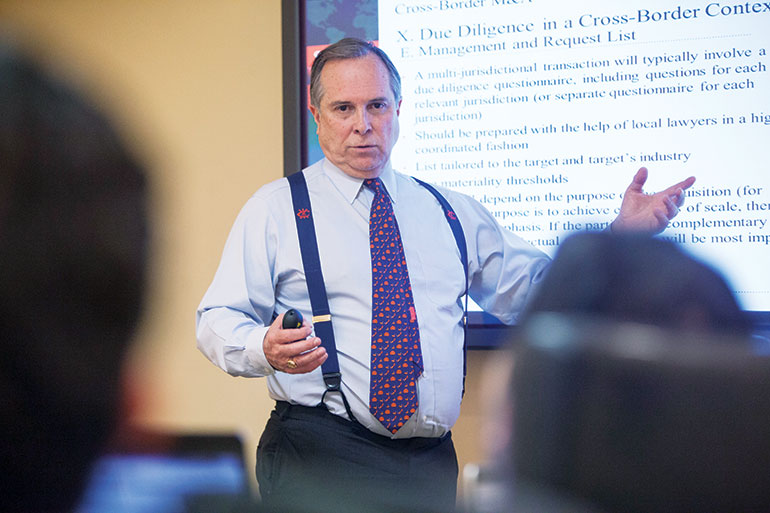
In Greece, Aldrich worked as general counsel for Citibank’s Middle East and Africa division on loan from Shearman. The couple rented an apartment on Mount Lycabettus with a view of the Acropolis, and Isabel taught at an American school while Dick traveled throughout the Middle East and Africa representing Citibank in loan transactions. He returned to Shearman’s New York office in 1980 with a wealth of experience in banking law and cross-border transactions.
Four years later, Aldrich accepted another overseas assignment—a three-year stint in Hong Kong, during which he again worked for Citibank and represented Chinese businesses pursuing joint ventures with American and multinational companies. Poised to compete in the international business community after years of isolationist policies, China was hammering out an accord outlining the terms of Hong Kong’s upcoming transition from British to Chinese rule when Aldrich arrived in the mid-1980s. “Chinese industries were government-owned and -operated, so I was essentially working for the Chinese government,” Aldrich said. Among other transactions, he represented Chinese entities in a coal mine venture with an American company and in connection with the development of a nuclear power plant.
Ultimately, Aldrich’s years of work for Citibank helped him achieve his original goal of returning to Brazil. Because of his assignment in Hong Kong, Aldrich had been forced to decline an opportunity to work with a Shearman team on the massive debt restructuring Brazil negotiated with Citicorp during the 1980s. When he returned to the U.S. in 1987, “I inherited the representation of the creditors in Brazil’s debt restructure,” he said. “There were 3,000 creditors and $120 billion worth of debt. It took seven years, but it was a wonderful experience—the most important thing I’ve ever done professionally.”
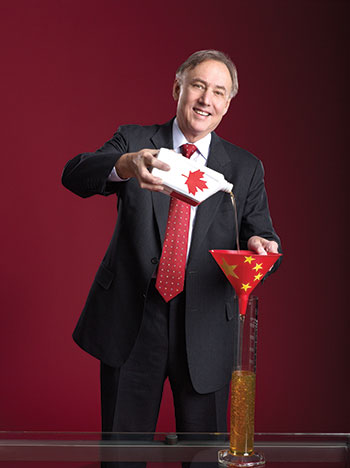
Like Aldrich, Paul Deemer ’75 (BA ’69) became an international pioneer for his firm, Vinson & Elkins. A native Kentuckian, Deemer joined V&E’s main office in Houston after law school. Deemer and his wife shared the goal of living abroad, and to their good fortune, Deemer’s assignment with V&E’s real estate group coincided with a dramatic increase of foreign investment in Texas real estate. In 1979, his knack for cross-border transactions made him the top candidate when an associate position opened in V&E’s sole foreign office in London. Deemer worked quickly to become dual-qualified to practice in the U.S. and England. “Many international transactions are governed by English law,” he explained. “When you’re practicing outside the U.S., it’s totally different from a U.S. practice. You’re always working in areas governed by laws you don’t know. Right now I’m working on projects in Egypt, Greece, China and Spain, and all of those deals are going to be governed by English law, but there are issues that need to be resolved under Egyptian, Greek and Spanish law, so you need to work with local lawyers who are qualified.”
During the 18 years the Deemers lived in London, he opened V&E’s Moscow office in 1991 and its Beijing office in 1997. Deemer’s experience launching the Moscow office highlights a major risk of work in many parts of the world: government instability. With legal work expanding throughout Eastern Europe, he moved to Moscow in August 1991, a week before Communist hardliners overthrew Soviet President Mikhail Gorbachev in a coup. While his family watched news footage of tanks patrolling the streets from their home in London, Deemer hunkered down in the new offices, where he failed to dissuade a group of clients from going into the streets to “see the action.” After the collapse of the Soviet Union, Deemer and the V&E team found themselves operating in a new country—the Russian Federation—and representing clients during the transition to a government led by Russia’s first popularly elected leader, Boris Yeltsin. In addition to the Moscow coup, Deemer also witnessed coups in both the Republic of Georgia and Togo during 1991. “These are challenges law school doesn’t really prepare you for,” he said.
Deemer now specializes in the development and financing of energy projects in China and other countries. He first visited China in the early 1990s while working on a transaction and then traveled throughout the country with his family on holiday. “I was electrified by it, and I still am, although it was a totally different place in those days,” he said. Deemer led the opening of V&E’s Beijing office in 1997, spending two years there before returning to London. He and his wife loved living in Beijing, and when the firm needed a senior presence, the Deemers moved there permanently in 2002. Their arrival coincided with the infamous SARS epidemic. “Business basically shut down for half a year,” Deemer recalled.
“Then when SARS ended, business exploded. Chinese companies, particularly oil and gas companies, began making acquisitions in Latin America, the Middle East, and central Asia. We started out in 1997 expected to represent foreign energy companies going into China, and we ended up representing Chinese oil and gas companies investing outside of China.”
Deemer was highlighted by The American Lawyer as a “Dealmaker of the Year” in 2010 for his role in representing Chinese state-owned oil giant Sinopec Corporation in its $7.2 billion acquisition of Canada’s Addax Petroleum, a deal which gave Sinopec oil field assets in Nigeria, Gabon and Iraq. Deemer’s relationships with Chinese state-owned enterprises, which date back more than a decade, have been a crucial factor. “In China, your relationship with your client, business partner or friend is the key to success, and it’s not a short-term matter,” he said.
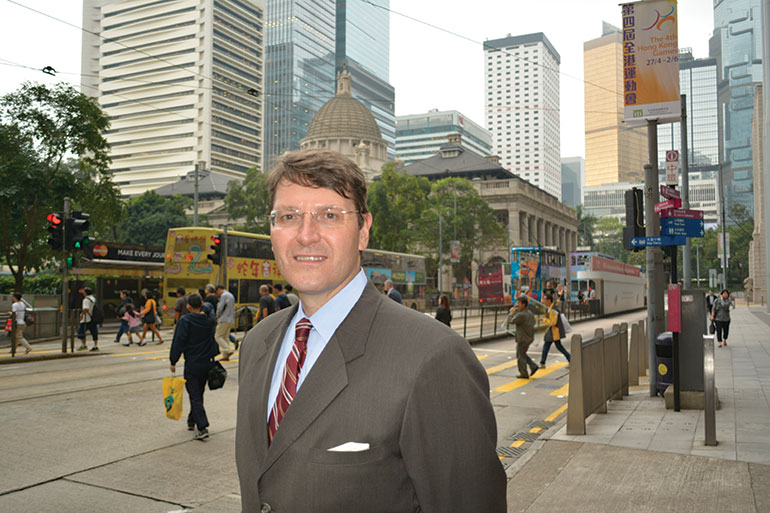
Eric Szweda ’90 entered law school with a goal of developing an international practice. Szweda is now managing partner of Troutman Sanders’ Hong Kong office, where he also leads the firm’s international arbitration and dispute resolution team. He credits serving as editor-in-chief of the Vanderbilt Journal of Transnational Law and taking classes in international law from the late Igor Kavass, who specialized in comparative and trade law, and Australian scholar David Partlett as “greatly facilitating this interest.” After clerking for U.S. District Judge R. Allan Edgar, Szweda joined Troutman in Atlanta. “Fortuitously, my first piece of work was for the Japanese trading house Itochu Corporation,” he recalled. Szweda ultimately developed such a niche handling matters for Asian companies doing business in the U.S. that he began taking lessons in Mandarin from a Chinese graduate student at Georgia Tech.
When the opportunity arose to manage Troutman’s Hong Kong office in 2005, he and his wife, Elisa Davidson Szweda ’89, and their three daughters moved there. Szweda became dual-qualified as a Hong Kong solicitor “after more studying than I care to remember,” he recalled. “As an American attorney, a memorable moment was my first case in the Hong Kong courts, rising to address the judge, and saying, ‘My Lord,’ as I must in this former colony of the British Empire.” The common roots of the legal systems in the U.S. and Hong Kong worked to Szweda’s advantage. “While Hong Kong civil procedure differs from American procedure in some meaningful respects, both Hong Kong and America inherited the English body of common law, which remains remarkably consistent across the common law world, and that greatly facilitated my transition,” he said.
In the eight years since Szweda arrived to help build Troutman’s presence in Asia, the small outpost of five Hong Kong-based lawyers he originally inherited has grown to nearly 30 attorneys, and the firm has also opened offices in Beijing and Shanghai. “I’m as much executive as lawyer,” Szweda said. While he relished the opportunity to develop Troutman’s international operations, “being sent into what was essentially a small start-up operation meant that I had to figure out on my own much of what I had to master.”
Szweda has also learned to navigate management challenges in a very different culture. “Since I’m the foreign manager, my colleagues in China will sometimes say to me that my ideas, or the policies or expectations of the firm, will not work or are not reasonable because ‘that is not how things are done here’ or ‘you do not understand because you are not Chinese,’ ” he said. “Very quickly, you need to figure out when to accept these assertions and when to figure out a pathway around them. But my role as the bridge back to management in the United States, explaining differences in the practices and sometimes advocating for our colleagues in Asia, is equally important.”
Deemer and Szweda both emphasize the importance of personal relationships in doing business in China, and both have learned how to work effectively in countries where they neither spoke nor understood the language. “V&E had a presence in China before 1997,” Deemer said. “Our business today reflects more than 15 years of cultivation—getting to know people and working with them.” Language presents a continuing challenge for both men. “Most of the large commercial cases are handled in English in Hong Kong, but the documentary evidence may well be in Chinese or other languages,” Szweda said. “If you aren’t multilingual, then your other skills have to be very valuable to the local market and your organization.”
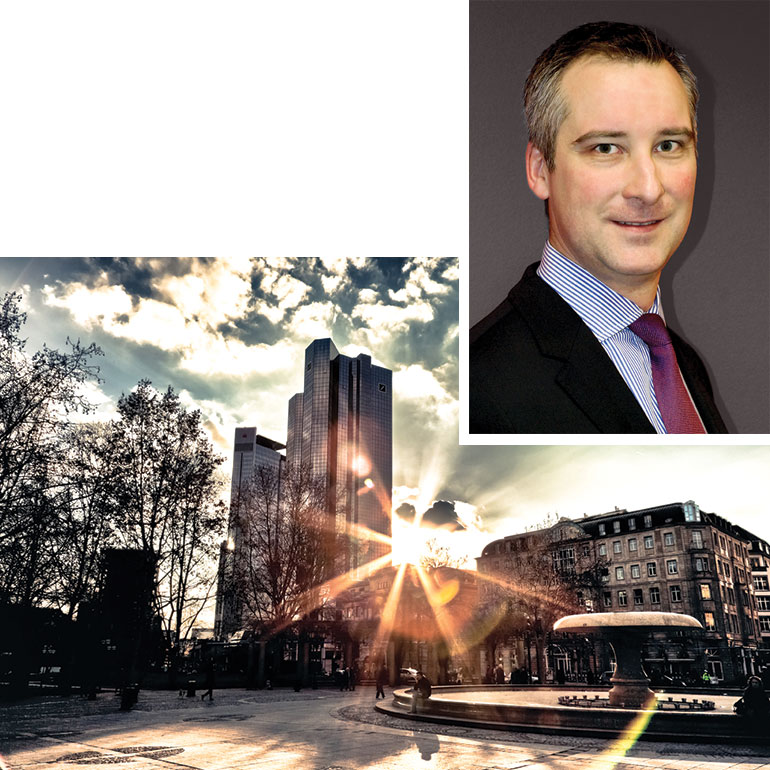
A dual citizen of the U.S. and Germany who grew up speaking German at home, Nicholas Baumgartner ’03 found it easier than most to make the transition to overseas practice. After taking a position in the capital markets practice at Freshfields Bruckhaus Deringer, one of London’s “Magic Circle” law firms, Baumgartner accepted a temporary assignment in Frankfurt that ultimately stretched to four years. “My group was based in London, but we were extremely busy with high-yield debt work in Germany, and the team in Frankfurt needed a German-speaking, U.S.-qualified associate,” he recalled. While Baumgartner’s involvement in international capital markets transactions meant working many nights and weekends, it also meant extensive travel throughout Germany, Austria, France, Italy, Switzerland, Russia and the U.K. “The work was incredibly interesting and challenging, and it had another major perk,” he said. “For example, after spending days and nights drafting an offering document with a Milanese client, we got to put our pens down and walk down the street to see an opera at La Scala!”
In 2007, Baumgartner was preparing to move back to London when he was temporarily dispatched to Hong Kong, where the IPO market was booming. After several months of what he termed “firefighting,” he returned to London just as the credit crunch was taking hold. “As the financial crisis increased in intensity, banks were teetering on the brink in London just as in the U.S. We had our hands full structuring and advising on ‘rescue rights offerings’—deals aimed at saving the U.K.’s High Street and retail banks, which had engaged in bad mortgage lending and made questionable acquisitions,” he said. “It was a difficult and uncertain time, but also a phenomenally interesting time, and we’re still feeling the effects of that period today.”
Baumgartner accepted his current position as assistant general counsel at Citi in London after working in the bank’s legal department on a six-month secondment, or loan, from Freshfields. He now heads the legal team covering Citi’s equity capital markets and equity-linked businesses throughout Europe, the Middle East and Africa. “What makes working at Citi so interesting is the depth and breadth of the institution, and how any given transaction can touch many different parts of the bank,” he said. Baumgartner was recently listed among Financial News’ 2013 “40 under 40: The rising stars of European legal services.”
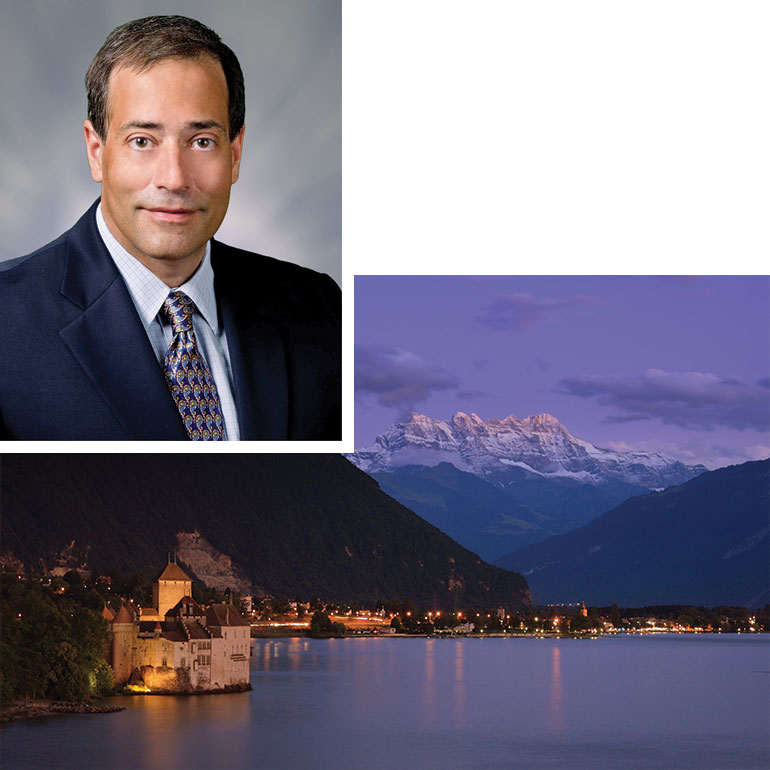
Christopher Ruggerio ’03 has worked at the World Intellectual Property Organization in Geneva since 2003. A recipient of the Ramonde I. Paul Scholarship, which is awarded to students who plan to focus on international law, Ruggerio worked in London and Paris before entering law school and knew he wanted to live and work abroad. “I took every international course Vanderbilt offered, and [former international law professors] Jon Charney and Hal Maier were both of great help to me,” he said. Charney was editor-in-chief of the prestigious peer-reviewed American Journal of International Law, and Ruggerio worked as an editorial assistant on the journal during Charney’s final year as editor. Ruggerio describes Charney as “a ‘Paper Chase’ professor—he would be really hard on you, but only if he thought you were worth it. He gave me a tremendous amount of time and effort.”
Ruggerio met his future employer, Deputy U.S. Trade Representative Rita Hayes, as a first-year legal clerk in the U.S. Trade Representative’s Office at the World Trade Organization in Geneva. After Hayes joined the World Intellectual Property Organization as deputy director general in 2002, Ruggerio served as a summer clerk in her office and then joined her permanent legal staff in 2003. At WIPO, Ruggerio relished the opportunity to assist senior attorneys on early drafts of the Beijing Treaty on Audiovisual Performances, a complex agreement finalized in 2012. As Hayes’ legal advisor, Ruggerio focused on her division’s work of copyright and intellectual property law enforcement. “I helped Ambassador Hayes put together a program that would be legally sound and diplomatically acceptable,” he said.
When Hayes’ term ended in 2007, Ruggerio transferred to WIPO’s in-house legal staff, where he focuses on commercial law. In the years since, WIPO Director General Francis Gurry, an internationally respected Australian intellectual property lawyer, has also assigned him to provide legal support to committees tasked with carrying out various administrative reforms. “That’s been a great experience,” Ruggerio said. “The nice thing about administrative law is that you gain such a broad view of the organization, its direction and how to apply regulations and rules to achieve objectives.”
Ruggerio now works regularly in French. “You have to know French—most of the support staff speaks French,” he said. But he acknowledges that “learning legal French was and remains very difficult.” However, Ruggerio’s biggest adjustment hasn’t been working in a foreign language. “It’s just a different lifestyle here,” he said. Ruggerio takes a streetcar two miles to his office. On the other hand, he has six weeks of vacation. “No one gets mad if you take it,” he said. “I do calls when I’m away, so I’ll work on vacation, which some people find surprising. The work/life balance is different in Europe.”
His work environment is different as well. As an international organization, WIPO operates outside national law. Ruggerio touts his Vanderbilt legal training as a big advantage. “Having a solid grounding in the common law of contracts and the Universal Commercial Code was really important,” he said. “In disputes, all of our contracts are arbitrated under UNCITRAL rules, which means they’re based on an internationally understood commercial logic. Fortunately, this logic tends to be very similar to the UCC and the common law of contracts.” Ruggerio supports WIPO’s Procurement Division, which manages purchases of more than 120 million Swiss francs per year. “I oversee all of the standard commercial contracts for WIPO procurement, and many are international,” he said. “The job is very hands-on. I get to do all kinds of different things, and I’m always learning something new.”
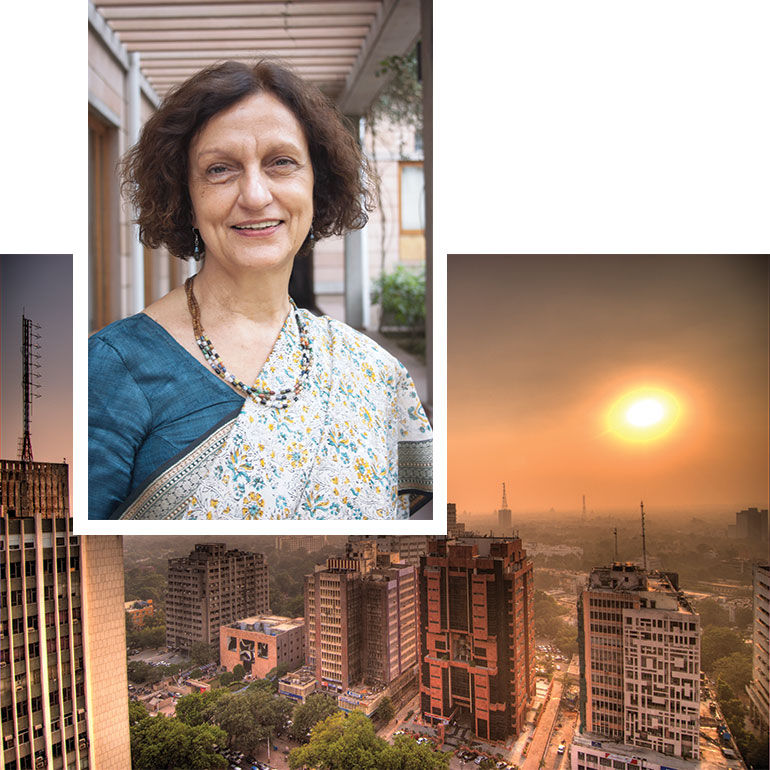
Winning a Fulbright Fellowship changed the course of Jane Schukoske’s career. After earning her law degree in 1977, Schukoske spent almost a decade as a public interest lawyer, rising to executive director of the Virginia Poverty Law Center. Then she earned an LL.M. at Georgetown and joined the faculty of the University of Baltimore School of Law, where she designed and directed an environmental justice project, and later, the Community Development Clinic. Awarded a Fulbright grant in 1995 for a Sri Lanka project that integrated her interests in environmental law and community development, she spent a month en route in Bangalore, India, teaching a clinical education course for law teachers from across South Asia. “I immediately went out and got some Indian clothes,” she added. “People really appreciated that show of respect and celebration.”
Although the teaching engagement was Schukoske’s first visit to South Asia, she quickly found herself on common ground with South Asian law teachers. “Having represented poor people as a legal aid lawyer and then as a clinician, I share a common set of values with professors who are interested in access to justice,” she said. “However, most Indian law teachers have not practiced law, and that has slowed the spread of clinical legal education.”
Schukoske has written a number of book chapters and articles for South Asian audiences on learning law through providing access to justice to marginalized communities. “My current approach is to encourage and mentor younger colleagues by co-authoring,” she commented. “Poverty in India is so much deeper than in the U.S. I am inspired by the urgent need to accelerate poverty alleviation in India and believe that legal educators have an important role in engaging their students to imbue social values and learn through service.”
Since her initial trip in 1995, Schukoske has spent more than 10 years in India, eight as the director of the Fulbright Commission in India and one serving as a full-time advisor to the group establishing the O.P. Jindal Global University and its first school, Jindal Global Law School. “One important goal of the university is to help change the theory-heavy lecture form of education that still prevails in many Indian institutions,” she explained. “The institution is also trying to strengthen a culture of research in law.” Since the university’s founding, she has served on its governing body.
After coming back to the University of Baltimore for two years to direct an LL.M. program for foreign lawyers, Schukoske returned to India in 2011 to serve as chief executive officer of the Institute of Rural Research and Development, an initiative of the S.M. Sehgal Foundation, an Indian trust that promotes effective governance and access to essential services for rural communities. “After years of teaching, I decided to move to a position where I could work more directly on social justice issues and connect students of law and other disciplines to that work,” she said. “Our priorities are water, sanitation, agricultural enhancement and governance. We’re working in villages where the schools don’t have water or toilets. Our team includes lawyers, economists, engineers, an agronomist, and social work experts as well as a field staff of 80 local people whom we have trained. At IRRAD, I draw on my experiences as a rural resident, legal aid attorney, legal educator, international educator and nonprofit organizational leader. Law students from India and abroad work with us on our governance program in villages and on policy research.”
In 2011, Schukoske, who lives in Gurgaon, a city near Delhi, served as the only foreigner on a subcommittee of the Planning Commission of India on fostering community-university engagement. As a member of the American Bar Association International Law Section’s India Committee, Schukoske is also engaging colleagues in writing about the status of women in the legal profession in India for a special issue of the Committee’s newsletter. “My vantage points have been from the international education and NGO sectors, rather than law practice, which is not permitted for foreign lawyers in India. Too often, I have been in leadership settings in which women were underrepresented,” she said.
Schukoske finds it fascinating and challenging to work cross-culturally. “I learn constantly,” she said. “I draw on principles from the systems in the U.S., although the Indian context operates in its own unique ways.”
The rapid pace of globalization afforded these attorneys the opportunity to create pioneering legal careers that transcend national borders. All believe that global practice is the future, and advise young attorneys to seize opportunities to work overseas. “You get much more experience overseas,” Dick Aldrich said. “And just navigating different cultures is wonderful training for a lawyer.”
